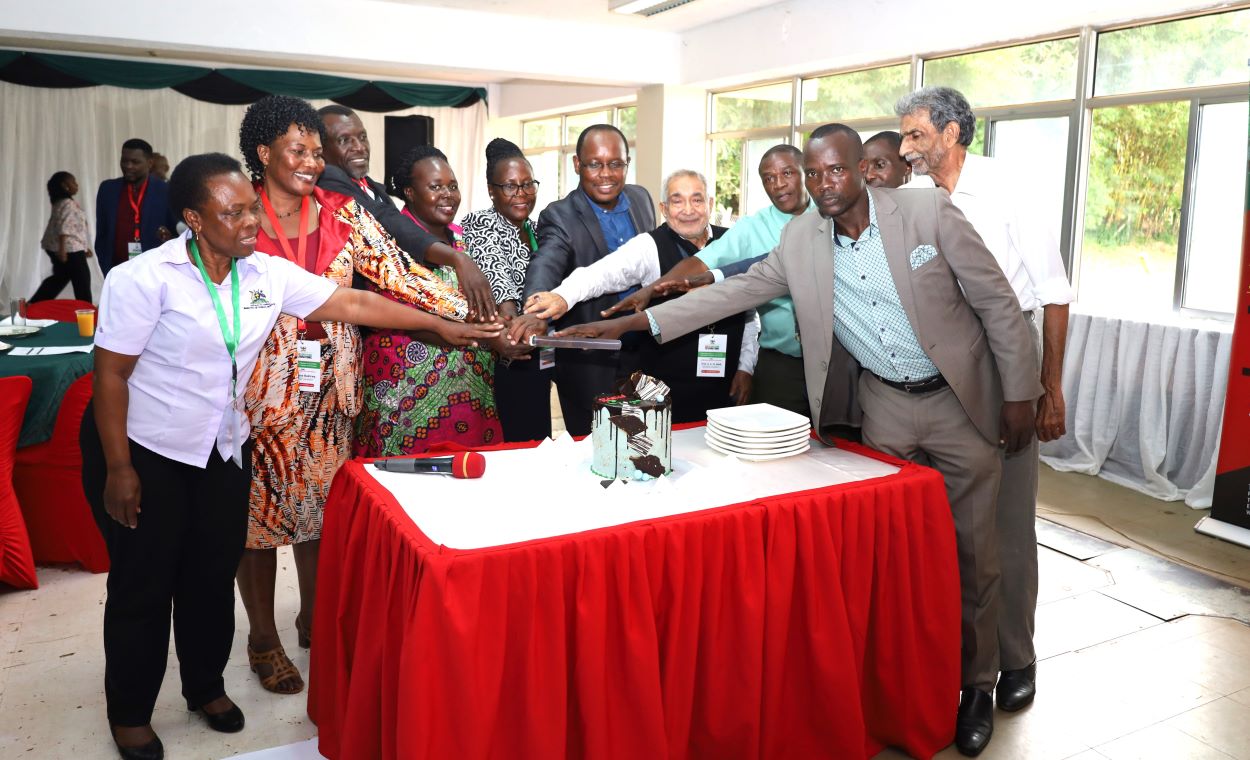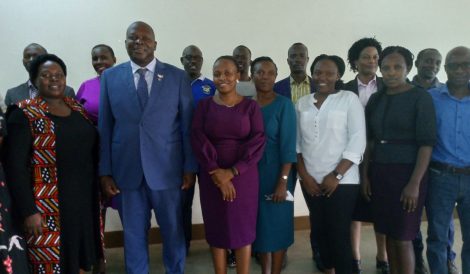The three –day celebrations to mark the 60 years of the East African School of Library and Information Sciences (EASLIS@60) service to humanity were crowned by a Luncheon on Friday 10th November, 2023.
The closing ceremony was graced by the Director, Directorate of Graduate Research and Training Prof. Edward Bbaale as Chief Guest. Prof. Bbaale implored information scientists to contribute to the development of research and innovation hub at Makerere university and also embrace digital technologies in management of information and data.
Describing the event as a testament to Makerere University’s unwavering commitment to academic excellence, research and the nurturing of intellectual talent, Bbaale said, library and information sciences play a pivotal role in any university, serving as a cornerstone for teaching, research, and innovation.
He explained that Makerere University activities are guided by the Strategic Plan for 2020-2030, which is a visionary roadmap that aims to transform Makerere into research-led and innovation-driven institution. This vision according to the Director, rests upon three fundamental building blocks, each playing a crucial role in the transformative journey.
The first building block emphasizes a distinct shift towards increased graduate enrollment, particularly at the doctoral and postdoctoral levels. The goal according to Prof. Bbaale is to raise the share of graduate students. Presently the graduate student population stands at around 12% with only 2% being international students.
“As the school celebrates 60 years, it is time to rethink vividly raising graduate enrolment because you hold a key role in trying to raise a generation of people that can be sources of information and data and guidance to national transformation,” Bbaale appealed.

The second building block according to the Director focuses on building research entities designed to catalyze large-scale, multidisciplinary, and multi-institutional research activities. Supported by the policy on the establishment of research entities and institutions of 2021, these entities are envisioned as hubs of innovation, fostering collaboration that transcends boundaries.
“You are the source of information. These research centers will not thrive without you. And we are very happy that you have trained many people and the many libraries are benefiting from you. We can also look at this scenario where you can work to empower research hubs that we have. You have a responsibility to help these research hubs come up because the university is saying, we don’t have any other way we shall be research intensive, we don’t have any other way, we shall be innovation-driven until when we have established large research entities, centers of excellence’ He said.
The third building block underscores the importance of packaging and marketing research outputs for effective adoption and adaptation to impact communities. Initiatives like the Makerere UNDP Innovation Hub aligns with this vision and this is supported by policies like the intellectual property management policy and the research and innovations policy of Makerere University.

“The East African School must work collaboratively with the innovation hub. What are those aspects about innovation that must be developed through training? Because later on, the graduates that you are going to churn out must be able to support innovators through providing the requisite information that is needed”, The Director asserted.
Prof. Bbaale congratulated the school upon its milestones and challenged experts to move with the university aspirations on grounds that library and information science field, focusses on the interactions between people, information, and digital technologies which plays a vital role in enhancing information creation, access, management, sharing, and societal benefit.
As the Directorate of Research and Graduate Training, Prof. Bbaale said they acknowledge the strong complementarity working relation between the DGRT mandate and the expertise of the EASLIS in terms of dealing with the student information, creating repositories and making sure that information is available and usable very quickly when we need it.
Representing the Principal CoCIS, the Deputy Principal Dr. Peter Nabende expressed happiness that EASLIS which started in 1963 as an agreement between the then three countries in East Africa, Kenya, Tanzania and Uganda has survived throughout the years.
“It has, not only survived, but achieved greatly in many ways. It continues to uphold excellence in all aspects. From my observations, the levels of professionalism at EASLIS, the levels of commitment, they are the kinds of levels I have never seen anywhere else”. Dr. Nabende stated.
Nabende explained that the school has contributed significantly in terms of research and practice and preservation of records, serving as the main center of excellence in library and information sciences, and in addition continued to establish partnerships with highly reputable institutions worldwide.

Dr. Nabende observed that the school finds itself at a time when the world is advancing technologically but it is advancing in a sense that what is driving the advancement is information.
He called for more concerted efforts to remain the center of reference, through adopting new technologies in information and data management.
He attributed the success of the celebrations to the support from different stakeholders including university top management and the principal’s office for providing most of the funds, contributions from the collaborating institutions and all individuals that played various roles.
The Dean, EASLIS Dr. Sarah Kaddu said the event was to commemorate the relentless pursuit of knowledge, the unwavering commitment to excellence and the profound impact EALSIS has had on society and on to peoples’ lives.
She explained that the three day celebrations characterized by intellectual quiz and talk shows, the symposium and crowned with a luncheon, widened participants aperture, created a platform to meet new people to encounter new ideas and experiences.
The Dean said, the roots of EASLIS trace back to a vision of empowering communities through access to information, preserving knowledge, and nurturing an environment where the pursuit of learners knows no bounds.
“Our school’s legacy extends far beyond the confines of its physical structure. It embodies the spirit of dedication, innovation, and adaptability, among others. Libraries are not mere buildings stocked with books. They are sanctuaries of learning and inspiration, serving as bridges between the past, present and the future.
Information science as a discipline has evolved dramatically, translating boundaries and revolutionizing how we access, organize and disseminate information. Our institution has been at the front line of these changes, adapting and leading the transformations,” Dean noted.

Dr. Kaddu recognized the pivotal role played by the individuals who have been the driving force behind the school’s success. Kaddu recognized faculty members whose passion for scholarship and commitment to nurturing the minds of the next generation of professionals has been exemplary adding that the school has always been a beacon of academic rigor and integrity.
“I have noticed many changes over the years. Our commitment to excellence and nurturing of intellectual curiosity has remained unwavering. This anniversary is not just a testimony to the enduring dedication of everyone associated with this institution, but also a celebration of our collective achievements.” The Dean asserted.
The school she said, has witnessed the rise and disruption of technology as a catalyst, reshaping the landscape of information science.
“Our libraries have transcended physical boundaries, extending into the digital realm. We’ve embraced these changes, fostering innovation and diversifying our programs to meet the demands of the modern era while upholding the fundamental principles that underscore our profession.
Furthermore, our collaborations and partnerships with other institutions, organizations, and communities have not only enriched our education environment, but have also empowered us to make a broader and more meaningful impact on the communities we serve”, Dr. Kaddu assured.
Looking towards the future, Dr. Kaddu said, the school is poised at an exciting juncture with a horizon of possibilities they must continue building on. As the school embarks on the next phase, the Dean called upon faculty and alumni to remain adaptable, resilient, embracing change, while staying rooted in the values and principles that have been the bedrock of this school for six remarkable decades.
Dr. Kaddu expressed gratitude to all who have contributed to the success of this institution and the celebrations.
Four recognized for their outstanding service to EASLIS
The closing ceremony was also marked by awards of four distinguished personnel who have served the school in different capacities.

The Rising Star Award was presented to Mr. Geoffrey Magimbi in recognition of his outstanding academic resilience and success. Magimbi, joined the school as a custodian without any academic paper. Being in the academic circle, he was inspired and determined to enrol for a certificate course , then a diploma, to a bachelors and now pursuing Masters. He has also served in the Ministry of Public service and currently working with the Mountains of the Moon University.

The Leadership Award was presented to Prof. S. AH. Abidi in honor of his long and exemplary service as Director EASLIS (1972-2002). Another Leadership Award was presented to Ms. Sarah Kagingo in absence in appreciation of her loyalty and dedicated service as the first Guild President from EASLIS (1997-1998)

The Service award was presented to Boniface Odongo with deepest appreciation for his outstanding contribution as the longest serving librarian from 1996-2012 . Odongo who was unwell, was represented by her daughter Aguttu.



